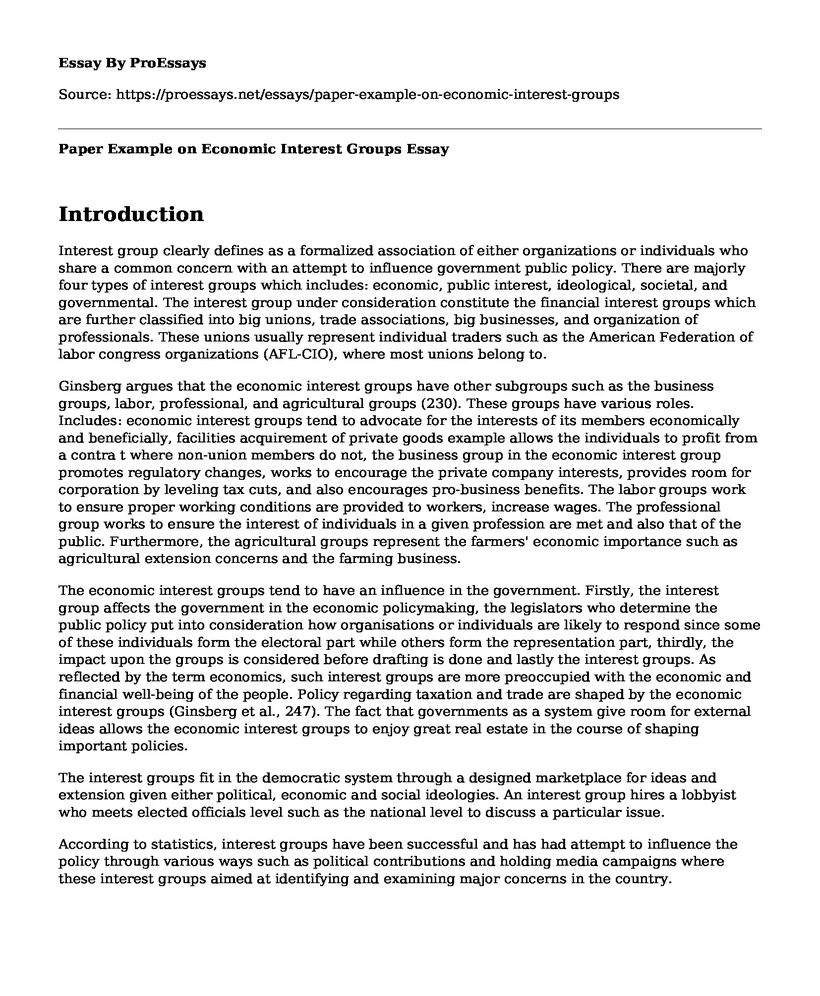Introduction
Interest group clearly defines as a formalized association of either organizations or individuals who share a common concern with an attempt to influence government public policy. There are majorly four types of interest groups which includes: economic, public interest, ideological, societal, and governmental. The interest group under consideration constitute the financial interest groups which are further classified into big unions, trade associations, big businesses, and organization of professionals. These unions usually represent individual traders such as the American Federation of labor congress organizations (AFL-CIO), where most unions belong to.
Ginsberg argues that the economic interest groups have other subgroups such as the business groups, labor, professional, and agricultural groups (230). These groups have various roles. Includes: economic interest groups tend to advocate for the interests of its members economically and beneficially, facilities acquirement of private goods example allows the individuals to profit from a contra t where non-union members do not, the business group in the economic interest group promotes regulatory changes, works to encourage the private company interests, provides room for corporation by leveling tax cuts, and also encourages pro-business benefits. The labor groups work to ensure proper working conditions are provided to workers, increase wages. The professional group works to ensure the interest of individuals in a given profession are met and also that of the public. Furthermore, the agricultural groups represent the farmers' economic importance such as agricultural extension concerns and the farming business.
The economic interest groups tend to have an influence in the government. Firstly, the interest group affects the government in the economic policymaking, the legislators who determine the public policy put into consideration how organisations or individuals are likely to respond since some of these individuals form the electoral part while others form the representation part, thirdly, the impact upon the groups is considered before drafting is done and lastly the interest groups. As reflected by the term economics, such interest groups are more preoccupied with the economic and financial well-being of the people. Policy regarding taxation and trade are shaped by the economic interest groups (Ginsberg et al., 247). The fact that governments as a system give room for external ideas allows the economic interest groups to enjoy great real estate in the course of shaping important policies.
The interest groups fit in the democratic system through a designed marketplace for ideas and extension given either political, economic and social ideologies. An interest group hires a lobbyist who meets elected officials level such as the national level to discuss a particular issue.
According to statistics, interest groups have been successful and has had attempt to influence the policy through various ways such as political contributions and holding media campaigns where these interest groups aimed at identifying and examining major concerns in the country.
Conclusion
The techniques used to ensure this success is size and resources. Having a large group of individuals with common interest or goals who aim for the public interests. The legislators who are accountable to voters, therefore, the more the support, the more likely to obtain government support (Defending U.S economic interests in the changing Arctic, 2012). Furthermore, resources such as financial resources are very important though critical. In several cases, the financial needs are used directly to influence politicians through various ways like going for goal or having dinner. However, this is done by the lobbyist.
Work Sited
Ginsberg, Benjamin, Theodore J. Lowi, Margaret Weir, Caroline J. Tolbert, and Robert J. Spitzer. We the People: An Introduction to American Politics. New York: W.W. Norton & Company, 2013. Print.
U.S. G.P.O (2012). Defending U.S economic interests in the changing Arctic. Washington.
Cite this page
Paper Example on Economic Interest Groups. (2022, Jun 04). Retrieved from https://proessays.net/essays/paper-example-on-economic-interest-groups
If you are the original author of this essay and no longer wish to have it published on the ProEssays website, please click below to request its removal:
- Does Globalization Help All People Within the System? - Essay Sample
- Argumentative Essay on Hollitz Ch. 9
- A Shift in Demand and Supply Paper Example
- Similarities Between Skills Approach and Trait Theory - Research Paper
- Essay Example on Analyzing Community Challenges: A Necessity of Life
- Absences: Guidelines & Terms for Employees - Essay Sample
- Employment Status: Employee vs Worker - Essay Sample







